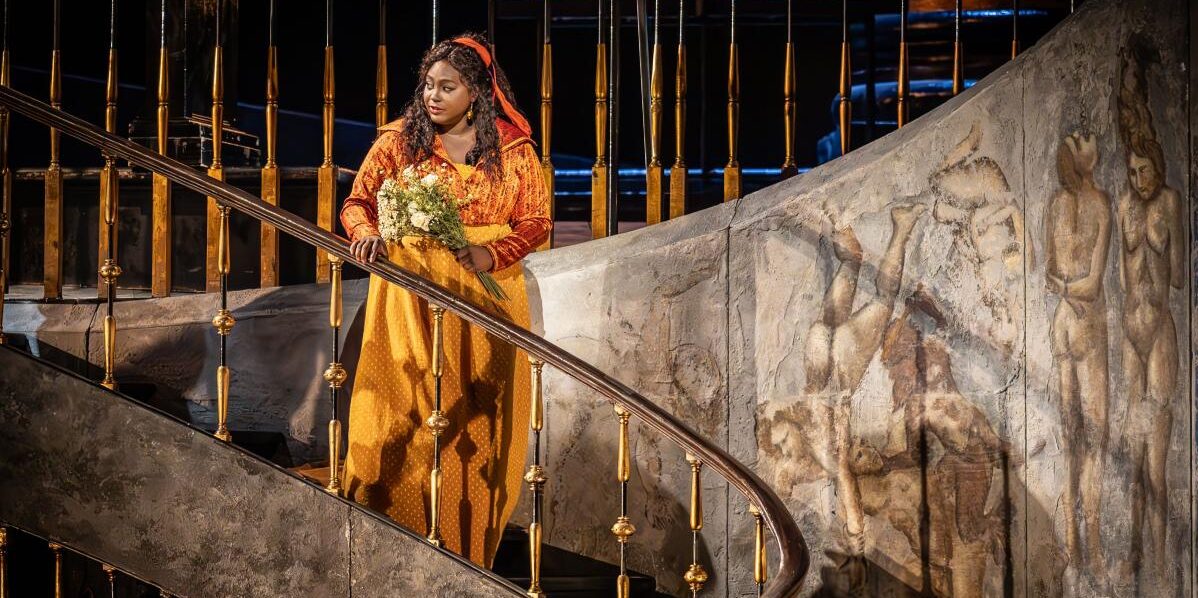The revival of Jonathan Kent’s 2006 production of Puccini’s Tosca (this is the 17th revival!), delivers once again, a compelling performance marked by exceptional vocal talent and nuanced drama. Yet, this is uneven performance, marked by vocal brilliance and varied acting prowess. The production showcased standout moments, particularly due to the exceptional vocal talents of the lead performers.
Set in Rome and the date is 17-18 June 1800. The short-lived Roman Republic under the rule of Napoleon Bonaparte, reverted to the tyranny of the Pappal States a year earlier (1799) and now Napoleon’s army is advancing once again from the north. We don’t see any of this, it merely interweaves into the body of the unfolding drama.
The central narrative is about the invasion of politics into ordinary people’s lives. Violence and sensuality are there in abundance keeping the audience on edge throughout. This production secures the melodramatic edge on offer through the orchestration and brilliant performance by Angel Blue, in the title role, and Aleksei Isaev in the role of Baron Scarpia, the Chief of Police. These two hold firmly the pillars of the two opposing forces – art and tyranny. The opera commences in a church and ends in the gallows.
A political prisoner, Cesare Angelotti (Christian Federici), reaches the church of Sant’Andrea della Valle, where his sister has hidden disguise clothes to aid his escape. Mario Cavaradossi (Russell Thomas), an artist, is painting Maria Magdalena. Angelotti’s beautiful sister, praying in the church, inspires the artist’s portrait of his subject. The fugitive and the portrait of his sister act as catalysts that drive the narrative to unimaginable consequences. This initiates the involvement of Mario Cavaradossi and, indirectly, the love of his life, Floria Tosca, drawing them into a web of political intrigue and danger that puts their lives within the firing line.
Federici’s voice did not convey the necessary strength and vulnerability of his character. Russell Thomas (tenor) has a rich and resonant voice, conveying lyrical beauty but occasionally falling short on emotional depth. This was evident when he sang his aria “Recondita armonia” in Act I, and even in the final act, where in “E lucevan le stelle,” the emotional longing and melancholy were well sung but not moving. His portrayal of Cavaradossi, the artist madly in love with Tosca, lacked the emotional connectivity and chemistry needed to fully engage with Blue’s Tosca. The romantic and dramatic tension between the characters felt underdeveloped, somewhat diminishing the overall impact of their scenes together. Occasionally, Thomas could not project his voice over the orchestra, allowing some dramatic passages to be drowned in the powerful music from the pit.
Angel Blue’s Tosca is a commanding figure. Her voice has both lyrical beauty and dramatic intensity. Her character is deeply emotional, experiencing a wide range of feelings from love and jealousy to despair and fury. Angel Blue convincingly expresses these emotions on stage. One couldn’t help but be moved by her singing of “Vissi d’arte,” one of the most famous arias of this opera. Blue’s technical skill, emotional depth, and dramatic presence secured a long applause from the audience.
Baron Scarpia, performed by Aleksei Isaev, who stepped in for Ludovico Tezier, is vocally impressive and dramatically compelling. Isaev brought a unique and subtle brilliance to the Chief of Police. His interpretation was marked by a delicate balance of cruelty and humour, an unusual yet effective combination. Isaev’s ability to inject fine threads of cynical humour into his portrayal added a new dimension to the tyrannical character.
Under the baton of Andrea Battistoni, the Royal Opera House Orchestra teased out the rich colour and timbres of Puccini’s score, enhancing the dramatic atmosphere. However, it occasionally overpowered the vocal lines, particularly of Thomas, making him inaudible in parts.
Despite some unevenness, this revival of Tosca remains a gripping and powerful production. The exceptional performances of Angel Blue and Aleksei Isaev, combined with Puccini’s masterful score, ensure that the opera continues to captivate audiences. The production successfully highlights the intense drama and emotional depth of Tosca, reaffirming its place as a cornerstone of the operatic repertoire.

